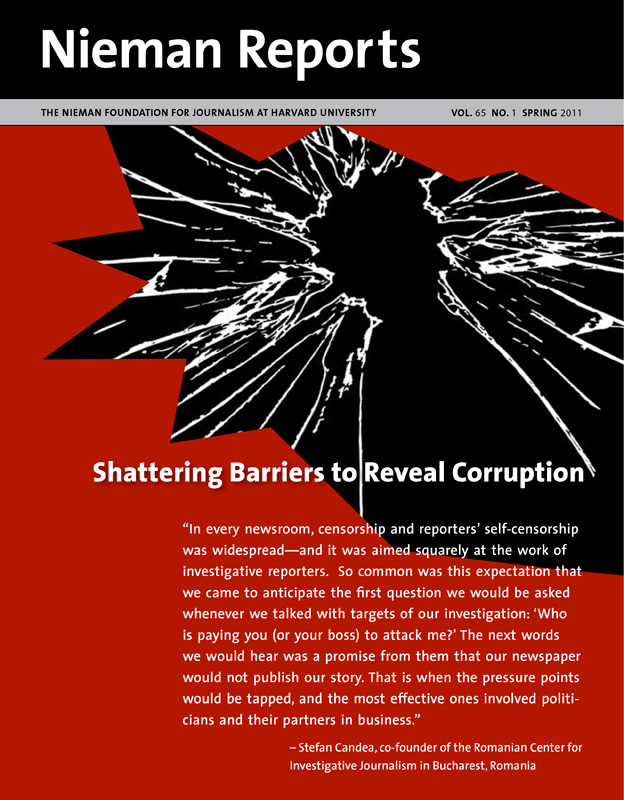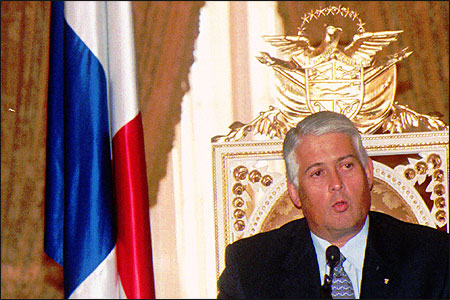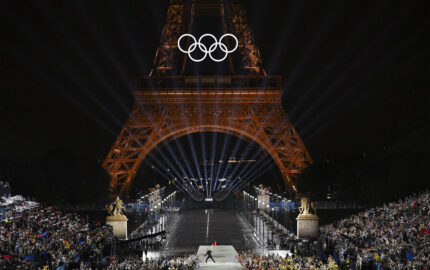
Shattering Barriers to Reveal Corruption
Barriers to reporting on corruption are numerous. Pushing past them can be risky, especially in countries where powerful interests are entrenched in business, media organizations, and government. Arrest. Legal action. Forced exile. Threats. Murder. Journalists face such dangers where the fear of what reporters might discover creates a climate of censorship and caution in newsrooms. Journalists describe the toll taken to tell stories about the corruption in their own backyards. Those who support their efforts speak to emerging strategies of training and assistance.

La Prensa investigated corruption during the presidency of Ernesto Pérez Balladares. Photo by Scott Dalton/The Associated Press.
La Prensa was able to publish a series of articles on casino licenses granted in 1999 by Panamanian government officials, but only after its investigation took a decade to complete. Still, when we broke this story in 2009, the initial installment cast only a blurry picture of what ended up becoming an exposé about an intricate network of payments that benefited an intimate circle of one, if not two, former Panamanian presidents.
On October 8, 2010, District Attorney Jose Ayu Prado's criminal investigations—inquiries that only started after stories appeared in La Prensa ("The Press")—concluded that there was enough evidence to press money-laundering charges against former President Ernesto Pérez Balladares, who served from 1994 to 1999. If the trial does take place, it will be the first time that a Panamanian head of state will face justice for money laundering, corruption or similar crimes.
Pérez Balladares is a clever, Wharton-educated politician who modernized Panama's economy by privatizing public utilities and obsolete state-owned enterprises. From the outset, his administration was plagued with rumors about dishonesty. He wasted no time in co-opting the Supreme Court of Justice by filling it with obedient appointees and blazing a shameful path imitated by other presidents who followed. By the time his term was coming to an end, casinos were privatized. The fact that the Constitution mandated that gambling and games of chance could only be run by the state was no impediment for securing a law allowing licenses "for the management" of casinos and gaming houses through a Congress controlled by his party. A provision was enacted, however, requiring that ownership of the private companies licensed to operate casinos be fully disclosed to the Gaming Control Board (Junta de Control de Juegos, JCJ).
More than a decade ago, the first tips reached reporters in our newsroom. They indicated that behind Pérez Balladares's efforts to modernize gambling, there was a hidden and more personal interest that should be investigated. Flashy, Las Vegas-inspired casinos mushroomed in Panama City and other metropolises. Even though a few tourists might be spotted inside, the usual gambling crowd consisted of middle- and low-income Panamanians. Gambling revenues burgeoned from less that $200 million in 1999 to $1.25 billion in 2010.
Opposition candidate Mireya Moscoso succeeded Pérez Balladares as president from 1999 to 2004. Her administration's initial investigation revealed that the JCJ had requested Spanish gambling conglomerate Cirsa, one of the licensees, to disclose the ownership of an obscure 24 percent belonging to some anonymous corporations. But this kind of regulatory pressure did not last long. The Moscoso administration ended up granting Cirsa additional licenses to operate gambling facilities, mainly more modest slot machine houses to be set up close to transportation hubs and shopping centers in low-income neighborhoods on the margins of the capital city and in rural towns.
RELATED ARTICLE
“Freedom of Information Laws in Latin America”
- Fernando BerguidoUntil 2002, Panama had no Freedom of Information Act (FOIA), as remains the case throughout most of Latin America. Unless they received leaked information, journalists had virtually no way to gain access to relevant documents. For two years prior to the law's enactment, a coalition of civil rights and international organizations demanded transparency and free access to government records. By the end of 2001, they had succeeded in getting a FOIA passed by the Congress, in large part because the opposition party controlled the legislature.
Moscoso was reluctant to sign the FOIA bill until a major corruption scandal erupted in Panama. Then she had no recourse but to sign Law 6 of 2002—known as the "Transparency Law"—as a way to diffuse the public outcry over serious accusations of bribery by several politicians on both sides of the aisle.
RELATED LINK
Resources for Investigative ReportersThis new legislation—intended to be the first in Latin America to regulate full access to public documents with provisions on how to petition for access and stipulating penalties for refusing to deliver information requested—proved to be too much for those who held political power at the time. In the middle of her term, Moscoso introduced an executive order—upheld by the Supreme Court—that added an inscrutable barrier to petitioners seeking access to public documents: Now the petitioner needed "to prove a legitimate interest," and only someone "related" to the matter in question was regarded as having this right. This legal tactic prohibited Panamanians—with journalists being a main target of this executive order—from requesting public information because it was determined that they lack a legitimate interest regarding affairs of the government.
When Martin Torrijos became Panama's president in 2004, he followed through on an electoral promise: He would eliminate Moscoso's executive order and the Transparency Law would become a genuine tool of public scrutiny. Even then, however, the news media were denied access to some of the most important public documents—those showing who were the real owners of casino licenses.
Five full years elapsed. Torrijos's election slogan of "Zero Corruption" became a national joke while thousands of dollars from Cirsa's profits were being diverted every month to a close group of friends, and even family members, of Pérez Balladares and Moscoso.
In 2009, a formal petition by La Prensa's investigative unit was finally addressed. This meant the newspaper gained access to some of the JCJ's files. At last we would be able to cast Walter Lippmann's "beam of a searchlight" into the darkness of the casino license situation in Panama.
From the start, the documents made it evident that ownership checks and due diligence requirements were not met and that a clear interest existed for covering up official oversights. Reporters started to do what an array of authorities was meant to do—they began to go after the paper trail. Each of the casino companies was investigated. Public records gave us enough leads to follow as we traced what transpired with former officials, lawyers and businessmen. We published stories and because of those stories, additional sources emerged. By this time, even JCJ officials—feeling the heat of public scrutiny—were pressuring casino operators to fill in gaps in licensees' files.
On August 3, 2009 La Prensa's lead story unveiled a key link: Pérez Balladares's son-in-law, Enrique Pretelt, and one of his closest friends and former cabinet members, Roosevelt Thayer, were shown to be on the payroll of companies previously unknown to the public. To follow the money trail (or a fraction of it) proved harder. At the end of our investigation, we assembled enough information to certify a connection with the final beneficiary of the casino profits: Dividends paid by Cirsa, after a circuitous route, ended up paying for the yacht, plane and credit cards of none other than Pérez Balladares.
It took two months for the attorney general's office to launch a full investigation. Threats and attacks from members of Pérez Balladares's and Moscoso's political parties against La Prensa and defamatory charges against its reporters started earlier—and have not ended. Pérez Balladares once wrote to a journalist who was not involved in this investigation: "Thanks for not taking part in disgracing me. But believe me, no matter how long it takes, once I am done with legal matters, it will be payback time," referring to those uncovering this case.
Tempting Danger
As philosopher Louis O. Mink once wrote, "Stories are not lived but told … There are hopes, plans, battles and ideas; but only in retrospective stories are hopes unfilled, plans miscarried, battles decisive, and ideas seminal."
RELATED ARTICLE
Roberto Eisenmann wrote about his role in the founding of La Prensa for the Spring 1994 issue of Nieman Reports [PDF].The casino case is just one of several high-profile, retrospective investigations La Prensa has taken on in recent years. In the process of working on them, reporters have faced many threats made against their lives—and not once have government officials or security agencies stepped forward to guarantee their safety. Groundless legal actions initiated against independent media have accrued and are left hanging for years.
Unveiling corruption throughout Latin America awakens dreadful instincts in powerful politicians while judicial systems—meant to protect liberty, promote accountability, and make possible a free press—have repeatedly turned their backs on journalists or, in some cases, even helped to suppress them.
Investigative reporters throughout Latin America travel paths that are always delicate and dangerous. Politicians visit our newsrooms and promise to defend freedom of the press and information, total openness, and transparency. Once in power, their promises turn to silence. We remain convinced that exposing acts of corruption is a duty from which we cannot waver—a daunting obligation in underdeveloped countries, yet a responsibility that is paired with unceasing recognition that journalists will end up in jail, and that circumstance might prove mild compared to other possibilities.
Fernando Berguido, a 2011 Nieman Fellow, is a lawyer and the publisher and editor of La Prensa, Panama's leading newspaper. He was a Fulbright scholar at the University of California, Los Angeles School of Law, where he earned a Master of Law degree. He also is a former president of the Panama chapter of Transparency International.


